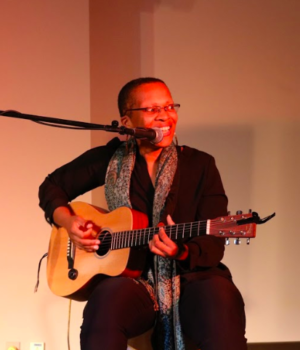Written by Devon Mitchell
On Thursday, Jan. 16, RC’s Kickin’ It Live program hosted a musical guest to help teach students about music throughout the Civil Rights Movement era in U.S. history. Lea Morris is a musician from the Baltimore area who has been playing and spreading her message for her entire life.
Throughout Morris’ childhood, she was exposed to music through her Baptist church. Morris jokes that growing up, the only music she was exposed to was gospel and soul. Although she had humble beginnings, Morris grew up to play music from all sorts of genres.
From a young age, she learned to play guitar and found a passion for playing and writing music. Now she uses her talents to remind people of the struggles our country has faced through the mistreatment of minorities and reminds her audience of the encouraging hope to strive for a more equal and better tomorrow.
Morris’s performance entitled, “Hope Springs Eternal” showcased music from the Civil Rights Movement as well as the Civil War era. She began with an excerpt from Dr. Martin Luther King Jr’s, I Have a Dream speech and an acapella rendition of My Country ‘Tis of Thee. It beautifully set the mood for the rest of the night. Morris continued with songs such as Follow the Drinking Gourd and Wade in the Water. These song selections were used as instructions in disguise during the time of the Underground Railroad.
Morris explained that Follow the Drinking Gourd was used to instruct escaped slaves to follow the big dipper north and Wade in the Water was used to encourage them to use the water to hide from those looking for them. These songs, with tones of the gospel, made references to the Israelites in the bible who were freed from enslavement in Egypt. These comparisons were there to remind slaves on the run to persevere and have faith they would make it.
Additionally, contemporary songs made the list such as Songs of Freedom by Bob Marley and Blackbird by the Beatles. The first song had a beautiful quote which Morris emphasized.
“We must emancipate ourselves from our mental slavery,” said Morris. She explained that once we do this, “the possibilities are limitless.”
Morris delved into the history of the song Blackbird, explaining that Paul McCartney was inspired by the Civil Rights movement and wanting people to sing what was possible. The powerful messages behind these songs were not lost on the audience. Morris’s powerful voice helped the listener understand the rich history these songs were about.
As the energy in Cavern built up throughout the night, students were eventually invited to partake in the singing. When singing A Change is Gonna Come by Sam Cook, one student exclaimed that it was her favorite song. Morris gave her the microphone and took a step back. In the next song, Swing Lo Sweet Chariot, nearly everyone in the audience sang in unison. Morris expressed that this is what she felt was most important.
It was a unifying moment in Morris’s performance when others joined in the sharing of her passion. It reminded the audience of the hope and freedom we all wish to feel. This is what her message is: unity and hope.
“I want everyone to feel important, and leave feeling great, empowered, hopeful and their best self,” said Morris.




